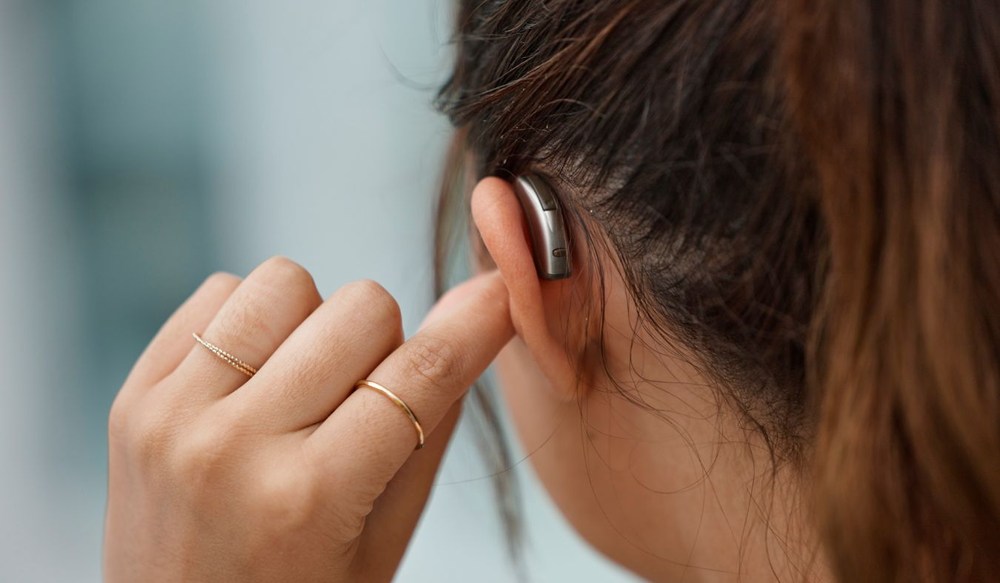Do I Need a Hearing Test? Screening Guidelines After 40
After 40, most of us get more intentional about health maintenance. You

By: admin | February 21, 2025
Being able to hear well means you can notice different sounds in your daily environment and understand conversations without needing to strain. When your hearing is functioning properly, you can follow conversations in quiet rooms and busier settings, hear the doorbell or your phone ringing from another room, and notice sounds like traffic or alarms that keep you safe throughout the day. You don’t have to ask people to repeat themselves often, and you can easily shift your attention between different speakers or sounds without feeling exhausted.
Paying attention to your hearing health helps you catch potential issues early, when they’re often easier to address. Even small shifts in how you process sound can affect your ability to communicate clearly, stay connected with others and respond quickly to your surroundings. Regular awareness of how well you’re hearing in different situations means you can take action before minor challenges become bigger obstacles. Knowing what regular hearing involves isn’t about worrying or looking for problems.
Sound begins as vibrations in the air, which your outer ear collects and channels into the ear canal. These vibrations reach the eardrum, causing it to vibrate in response. The eardrum acts as a barrier and a translator, converting sound waves into mechanical movements that can be passed deeper into the ear.
The middle ear contains three tiny bones called ossicles, which amplify and transfer the vibrations from the eardrum to the inner ear. These bones work together to ensure the sound energy is strong enough to reach the fluid-filled cochlea in the inner ear. The middle ear also helps regulate air pressure so sounds are transmitted efficiently, which is why changes in altitude can make your ears feel “full” or blocked.
Inside the cochlea, the vibrations move through fluid, which causes tiny hair cells to bend. These hair cells convert mechanical movement into electrical signals. Each hair cell is tuned to a specific range of pitches, allowing you to detect different frequencies of sound. Once the hair cells generate electrical signals, they travel along the auditory nerve to the brain. The brain interprets these signals as recognizable sounds, like speech, music or environmental noises. It also helps you localize where sounds are coming from and filter out background noise to focus on important sounds.
This complex system allows you to respond to your environment and communicate effectively. The auditory system works continuously, often without conscious thought, helping you perform daily tasks like following conversations, enjoying music or noticing approaching vehicles. Because it relies on multiple parts working together, even small changes or damage in one area can affect how well you hear.
Our ears are designed to detect a wide range of sound frequencies, from the low rumble of a bass drum to the high pitch of a bird chirping. Different parts of the cochlea in the inner ear respond to different frequencies, allowing us to perceive both deep and high sounds. This range of hearing helps us understand speech, enjoy music and notice environmental sounds around us.
Sensitivity to specific frequencies can change over time. Many people begin to notice they have more difficulty hearing higher-pitched sounds as they age, which can affect understanding consonants in speech. Other factors, like noise exposure or certain medications, may also impact which frequencies are harder to detect. Understanding this range of hearing can help you recognize areas where you may need support or protection.
Even small changes in frequency perception can affect everyday activities. For example, missing high-pitched tones may make it harder to hear a smoke alarm or a child calling your name. Being aware of how your hearing performs across frequencies allows you to take steps to maintain your hearing health or seek guidance from a professional if necessary.
Some changes in hearing are subtle and easy to overlook. You might notice needing to ask people to repeat themselves more often or straining to follow conversations in noisy settings. These early signs can help you identify when it’s time for a hearing check.
Other common indicators include frequently turning up the volume on your television, radio or phone, or finding that certain voices or sounds are difficult to hear clearly. You may also feel more tired or frustrated in social situations because you are working harder to follow conversations.
Paying attention to these signals is important because addressing hearing concerns early can help prevent further challenges. Even if your hearing seems fine most of the time, recognizing patterns in these everyday experiences allows you to take proactive steps to maintain your hearing and speak with a professional when needed.
Hearing can be influenced by a variety of factors that affect the ear’s structure and function. Age is one of the most common influences, as the tiny hair cells in the inner ear that detect sound naturally lose sensitivity over time. Genetics also play a role, with some people inheriting traits that make them more susceptible to hearing changes or conditions that affect ear function.
Noise exposure is another significant factor. Repeated exposure to loud sounds, whether from work environments, concerts, power tools or personal listening devices, can damage the delicate structures in the inner ear and lead to gradual or sudden hearing reduction. Even short-term exposure to very loud sounds can temporarily impair hearing, though repeated exposure can make these effects permanent.
Medical conditions and certain medications can also impact hearing. Chronic illnesses such as diabetes, high blood pressure or circulatory problems can reduce blood flow to the inner ear, affecting its ability to process sound. Ototoxic medications, which include some antibiotics, chemotherapy drugs and high doses of aspirin, can also interfere with ear function. Structural issues, such as fluid buildup, ear infections or abnormalities in the middle or inner ear, may further contribute to hearing changes. Together, these factors shape how hearing develops and changes across a person’s life.
Hearing assessments are the primary way hearing specialists understand how well your ears are working. These evaluations measure a range of factors, including the quietest sounds you can detect at different pitches, how well you understand speech and how your ears respond to pressure changes. Even if you feel your hearing is fine, tests can reveal subtle differences that may not be obvious in everyday life.
During a hearing assessment, your hearing professional will use specialized equipment to test both ears individually and together. This helps identify whether any hearing difficulty is consistent across pitches or occurs only at specific frequencies. Assessments also help determine whether changes are related to the outer, middle or inner ear, giving a clear picture of overall auditory function. Having this detailed information allows a hearing specialist to provide personalized guidance and recommendations for maintaining hearing health.
Regular hearing assessments are more than just diagnostic tools. They provide a baseline to compare changes over time, helping you catch potential issues early. Early detection can make it easier to address concerns and maintain quality of life, even if you aren’t noticing obvious changes in your daily listening experiences.
Everyday habits can have a big impact on long-term hearing health. Limiting exposure to loud sounds and using hearing protection in noisy environments are essential ways to prevent damage. This includes occupational noise, concerts, personal audio devices at high volumes and even sudden loud events like fireworks.
Regular checkups and routine hearing assessments are another key part of protecting your ears. These evaluations provide insight into how your hearing is functioning over time and identify any early warning signs. Paying attention to medications and medical conditions that may affect hearing is also important, as some drugs and health issues can impact ear function. Combined, these steps help maintain hearing health and prevent gradual changes from becoming more serious over time.
Tinnitus, often described as ringing, buzzing or other phantom sounds, can occur with or without measurable hearing loss. It originates from the way the brain and auditory system respond to sound, sometimes as a reaction to ear damage, noise exposure or changes in auditory pathways. These sounds can vary in pitch, intensity and duration, and they can be constant or intermittent.
While tinnitus is usually not a sign of a serious medical condition, it can affect concentration, sleep and overall comfort. A specialist can evaluate tinnitus alongside standard hearing tests to understand its potential causes and patterns. Understanding what is happening in the auditory system can help individuals manage the experience more effectively and reduce its impact on daily life.
Knowing when to see a hearing specialist can make a big difference in maintaining your hearing health. If you notice any sudden changes in your ability to hear, such as one ear becoming noticeably quieter or muffled, it’s important to seek professional help as soon as possible. Sudden hearing loss can signal underlying medical issues that need immediate attention, and early evaluation often improves the outcome.
Persistent tinnitus, or phantom sounds like ringing, buzzing or hissing in your ears, is another sign to reach out to a hearing specialist. Even if the sounds are mild at first, they can affect focus, sleep and daily activities over time. A professional can assess whether tinnitus is linked to hearing changes, noise exposure or other factors and provide guidance on how to manage it.
Other situations that warrant a visit include difficulty following conversations in noisy environments, frequently asking people to repeat themselves or needing to turn up the volume on your devices higher than usual. Changes like these may seem minor, but they can indicate shifts in hearing function that are easier to address when caught early. Seeing a hearing professional ensures you have the right assessment, advice and tools to support your hearing and everyday communication.
Knowing how your hearing works and what to expect from it helps you recognize changes that may need attention. Understanding the way your ears process different sounds, the range of frequencies you can hear, and how your hearing interacts with daily environments gives you a clearer picture of your overall hearing health. This awareness helps you notice shifts, like difficulty following conversations in noisy spaces, trouble hearing certain tones or new ringing in the ears, so you can act before challenges grow.
If you experience sudden changes in hearing, persistent ringing or any other concerning symptoms, reaching out to a hearing specialist is important. At Ear Specialists, our friendly specialists are always ready to help you take the next step to better hearing. Contact our Omaha or Bellevue, NE hearing clinics at (402) 206-2198 to schedule an evaluation or ask questions.
Tags: background noise, causes of hearing loss, hearing health facts

After 40, most of us get more intentional about health maintenance. You
By: admin | January 19, 2026

A hearing aid fitting appointment is an important step in your hearing
By: admin | November 18, 2025

Hearing loss can sometimes make everyday situations more difficult, and it
By: admin | August 21, 2025
